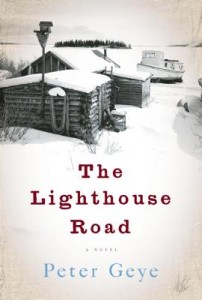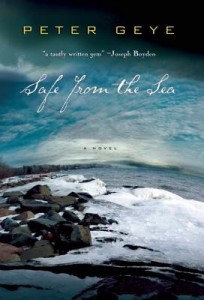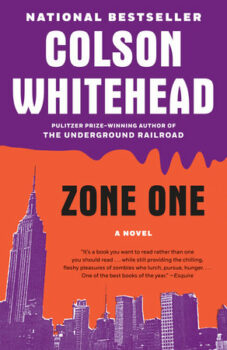 It’s been a long time since I’ve been to Duluth, Minnesota. Perhaps it’s been too long, because my original impetus for picking up The Lighthouse Road by Peter Geye was a sort of nostalgic affinity for the area. When I was younger, I drove three and a half hours due north, every time I had the opportunity, to sit in the harbor and watch the ships arrive and depart, to dig through the monstrous used book store on Superior Street, and to forage for agates on the north shore coast. I even put both knees into one of those pebble beaches, just north of Two Harbors, to make a wife out of a girlfriend. But, interestingly enough, although the book didn’t evoke the specific places I knew and remembered, it was a powerful reminder, by way of its characters, of how easily and deeply we can become interconnected with the physical spaces around us.
It’s been a long time since I’ve been to Duluth, Minnesota. Perhaps it’s been too long, because my original impetus for picking up The Lighthouse Road by Peter Geye was a sort of nostalgic affinity for the area. When I was younger, I drove three and a half hours due north, every time I had the opportunity, to sit in the harbor and watch the ships arrive and depart, to dig through the monstrous used book store on Superior Street, and to forage for agates on the north shore coast. I even put both knees into one of those pebble beaches, just north of Two Harbors, to make a wife out of a girlfriend. But, interestingly enough, although the book didn’t evoke the specific places I knew and remembered, it was a powerful reminder, by way of its characters, of how easily and deeply we can become interconnected with the physical spaces around us.
Set at the cusp of the twentieth century, The Lighthouse Road is a masterfully reconstructed landscape that has long since been washed away by passing time. It is generously haunted by a broad cast of very real, old-world souls who inflict love and pain upon one another with the acuteness possible only in the closest of human relationships. A study of human nature nearly as stark as the frigid landscape upon which it is set, the narrative of Geye’s second novel is thoroughly engaging from the opening pages.
The book’s playfulness with the story of Hosea, the name of one of Geye’s primary characters, isn’t essential to its themes, although a closer look at some of the names and a comparison to the Old Testament stories does provide a provocative lens through which we might explore the larger architecture of the narrative. There certainly are parallels that can be drawn to the Old Testament without exerting too much effort, especially to its stories of forsaken vows, whether to marriage or to God: Infidelity and the gravitational pull of physical yearning play no small part in moving Geye’s characters from one place to another as the story progresses. Geye’s Rebekah first appears in the novel as the fallen woman Ava, whose name, depending upon the source you choose to consult, is derived of a Hebrew word for iniquity and sin or displacement and exile. It is not necessary that readers of The Lighthouse Road prefer one entry over the other, for this additional, albeit subtle, layer of biblical meaning, operating in tandem with Geye’s clever diction, gives the larger whole of the novel a deliciously antiquated feel.
 In the earliest pages of the novel, Hosea plucks Ava from a life of sin and debauchery to offer her a slightly less suspect but, all the same, still morally questionable way of life, even providing her with a new name, the name of a pure woman: Rebekah. But decades later, even with her new name and identity, even in a new place, Ava/Rebekah cannot escape her concupiscent nature, and she finds herself leaving Hosea’s house to run away to the nearby city of Duluth with her half-brother, Odd. A local fisherman and periodic smuggler of various types of contraband, Odd’s primary infidelity in the novel is not his physical relationship with Rebekah, but the forsaking of his own true nature, and this seems to stem from the persistent and traumatic absence of his mother, a mother he never knew. Geye writes that Odd “was a fearful boy. He was scared of almost everything, but especially of the fact that he’d never had a mother,” and “passed his sleepless hours mulling the life he didn’t have.” This absence haunts him almost constantly in the first part of the novel, and crescendos to an encounter with a protective mother bear that inalterably fractures his perception of both his own identity and the broader world around him.
In the earliest pages of the novel, Hosea plucks Ava from a life of sin and debauchery to offer her a slightly less suspect but, all the same, still morally questionable way of life, even providing her with a new name, the name of a pure woman: Rebekah. But decades later, even with her new name and identity, even in a new place, Ava/Rebekah cannot escape her concupiscent nature, and she finds herself leaving Hosea’s house to run away to the nearby city of Duluth with her half-brother, Odd. A local fisherman and periodic smuggler of various types of contraband, Odd’s primary infidelity in the novel is not his physical relationship with Rebekah, but the forsaking of his own true nature, and this seems to stem from the persistent and traumatic absence of his mother, a mother he never knew. Geye writes that Odd “was a fearful boy. He was scared of almost everything, but especially of the fact that he’d never had a mother,” and “passed his sleepless hours mulling the life he didn’t have.” This absence haunts him almost constantly in the first part of the novel, and crescendos to an encounter with a protective mother bear that inalterably fractures his perception of both his own identity and the broader world around him.
There could be no better setting than the northern Minnesota woodlands and no better time than the threshold of the twentieth century for characters as roughly hewn as those found in this book. Geye, it seems, has skillfully accompished for the Midwest what Bruce Machart has, only a couple years ago, done for Texas in his bulletproof debut, The Wake of Forgiveness. It is the savage wilderness of the inner psychology of Geye’s characters, the primal hungers, fears, jealousies, and yearnings of the men and women in the story, that inhabit the back country that serves as his setting. Odd “knew the wilderness – the paths and meadows, the bear dens and beaver lodges . . . as he knew his own fears and desires.” His boyhood friend, Daniel Riverfish, tells him that the “woods are the world and the world ain’t an easy place,” and the two of them learn to navigate this landscape together.
It is only when Odd tries to become something other than what he is, when he turns his back on his true nature to follow the impulse of his desire for Rebekah, that his life begins to crumble. Just as Israel’s indulgences are punished in the Old Testament, so, too, are Odd’s excursions into a life of his own invention. “This isn’t who we are,” he tells Rebekah in the Harbor Suite of the Spalding Hotel in Duluth, “but it’s who we deserve to be.” Odd would be a far less sympathetic character were he not grounded in his own simplicity and honest nature, never allowing himself too much indulgence. He continues, in the very same dialogue, telling Rebekah, “it’s who we deserve to be, for a few days at least.” However, the very night the two of them arrive in Duluth, their new life together, the luxury hotel they stay in, “the big bed and fine linens, the gourmet dinner, the hot bath – was [already] showing its dim foolishness,” and the longer they stay in the city, the more their relationship decays. It is only when he returns to Gunflint, when he embraces who he is, when he accepts his place in the world, that he finds happiness. He tells his traveling companion, “I built this boat for all the wrong reasons, Harry . . . so I could run more whiskey. Catch more fish. Get more. But now I got all I want.”
Engaging as the narrative might be, however, what really makes Geye’s The Lighthouse Road an exceptional book is his exploration of the space between the inner psychology of his characters and the external geography of the world that they inhabit, and the network of moorings that hold the entire living system together like a great novel. The more eloquent of his analogies are the human skeleton in Hosea’s medical office and the white pine frame of Odd’s boat, both considered individually and conflated. Considering the former, “Odd studied the delicate curve of the ribs, the intricacies of the spinal column, the interconnectedness of the entire system . . . and thought of the boat,” and Geye’s readers have the privilege of watching these systems in motion. Whether it’s the system of characters that orbit one another in various or unusual ways or the larger system of interaction between the characters and the natural landscapes they must navigate, the attention drawn to the holistic order of things gives new and satisfying meaning to the movement of its parts.
Intriguing, too, is Geye’s meditation on how his characters both perceive, and apply meaning to, the world around them according to the individual contributions they make to the organic whole. Rebekah is a terrific example of this because she is many things to many people. She is a singular character, yet to Odd’s mother, Thea, she is friend and confidant, to Odd she is lover, to Hosea she is business partner. Each character has assigned his or her own meaning to her, and that meaning is an extension of the wilderness within each of them. It reflects what each of them needs and what they each want or need her to be.
Odd’s inner wilderness extends beyond the frontier of his form to come into contact with the wilderness around him. This is most exceptionally executed in one of the closing passages of the book where Odd’s emotional state is echoed by the physical world. In a moment of extraordinary cruelty during their final weeks together, Rebekah lashes out at Odd, “her words . . . like a punch.” Just after that, Odd looks out the window to notice that “the summer sky was squally.” He notes that “surely there [is] . . . a thunderstorm up there.” It is in passages like this that Geye shows us, most clearly, the places where the psychology of the characters brushes up against the nature of the landscape, and gives his readers momentary insight into the mechanics of how each is changed on account of the contact. Just as these pioneers have given the Northern Minnesota wilderness its identity, so, too, has it formed their identities, and the book’s characters become inseparable, in many ways, from their physical environment.
Weighing in just shy of 300 pages, The Lighthouse Road is one of those rare species of modest books that feels like an epic while it’s being read. Most likely, this is on account of both its historic breadth and the amount of time the author must have spent researching in order that it read with authenticity. A talented newcomer, Geye is not only particularly good at rendering his characters’ psychology and emotions, he’s damn good at drawing his readers into those metaphysical spaces, and this is, perhaps, where The Lighthouse Road achieves some of its great depth.





